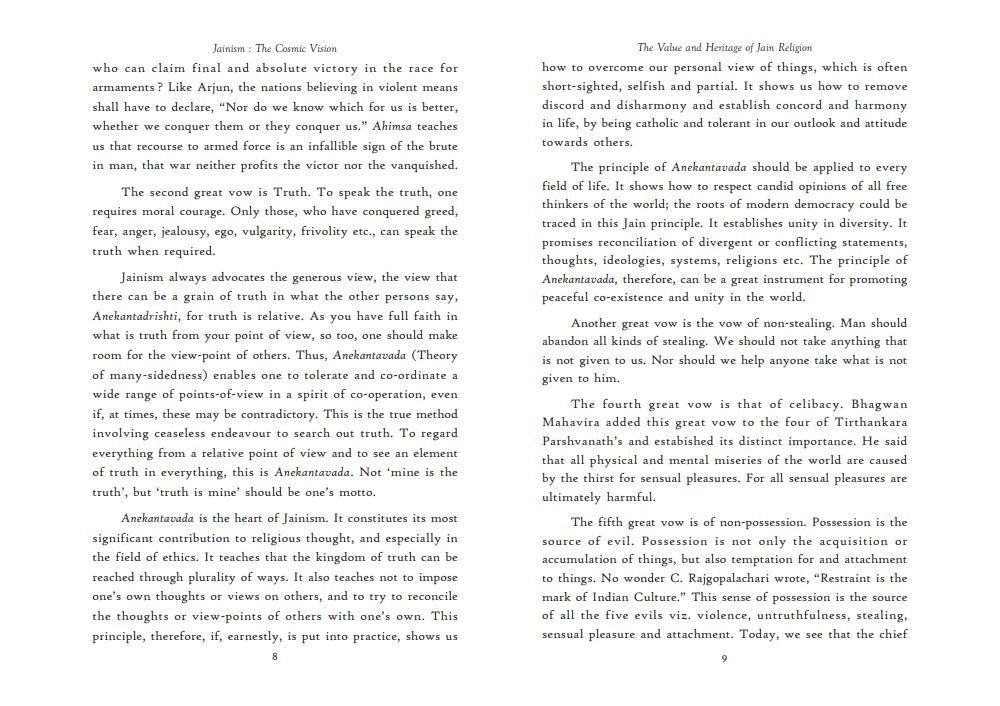________________
Jainism: The Cosmic Vision who can claim final and absolute victory in the race for armaments? Like Arjun, the nations believing in violent means shall have to declare, "Nor do we know which for us is better, whether we conquer them or they conquer us." Ahimsa teaches us that recourse to armed force is an infallible sign of the brute in man, that war neither profits the victor nor the vanquished.
The second great vow is Truth. To speak the truth, one requires moral courage. Only those, who have conquered greed, fear, anger, jealousy, ego, vulgarity, frivolity etc., can speak the truth when required.
Jainism always advocates the generous view, the view that there can be a grain of truth in what the other persons say, Anekantadrishti, for truth is relative. As you have full faith in what is truth from your point of view, so too, one should make room for the view point of others. Thus, Anekantavada (Theory of many-sidedness) enables one to tolerate and co-ordinate a wide range of points-of-view in a spirit of co-operation, even if, at times, these may be contradictory. This is the true method involving ceaseless endeavour to search out truth. To regard everything from a relative point of view and to see an element of truth in everything, this is Anekantavada. Not 'mine is the truth', but truth is mine should be one's motto.
Anekantavada is the heart of Jainism. It constitutes its most significant contribution to religious thought, and especially in the field of ethics. It teaches that the kingdom of truth can be reached through plurality of ways. It also teaches not to impose one's own thoughts or views on others, and to try to reconcile the thoughts or view-points of others with one's own. This principle, therefore, if, earnestly, is put into practice, shows us
The Value and Heritage of Jain Religion how to overcome our personal view of things, which is often short-sighted, selfish and partial. It shows us how to remove discord and disharmony and establish concord and harmony in life, by being catholic and tolerant in our outlook and attitude towards others.
The principle of Anekantavada should be applied to every field of life. It shows how to respect candid opinions of all free
odern democracy could be traced in this Jain principle. It establishes unity in diversity. It promises reconciliation of divergent or conflicting statements, thoughts, ideologies, systems, religions etc. The principle of Anekantavada, therefore, can be a great instrument for promoting peaceful co-existence and unity in the world.
Another great vow is the vow of non-stealing. Man should abandon all kinds of stealing. We should not take anything that is not given to us. Nor should we help anyone take what is not given to him.
The fourth great vow is that of celibacy. Bhagwan Mahavira added this great vow to the four of Tirthankara Parshvanath's and estabished its distinct importance. He said that all physical and mental miseries of the world are caused by the thirst for sensual pleasures. For all sensual pleasures are ultimately harmful.
The fifth great vow is of non-possession. Possession is the source of evil. Possession is not only the acquisition or accumulation of things, but also temptation for and attachment to things. No wonder C. Rajgopalachari wrote, "Restraint is the mark of Indian Culture." This sense of possession is the source of all the five evils viz. violence, untruthfulness, stealing, sensual pleasure and attachment. Today, we see that the chief




